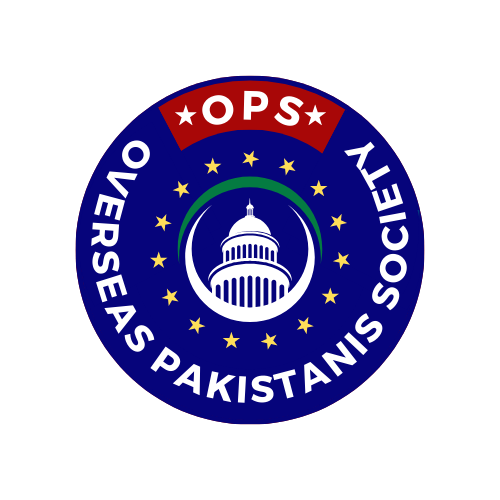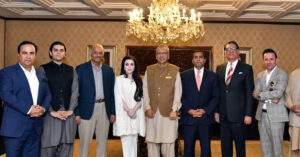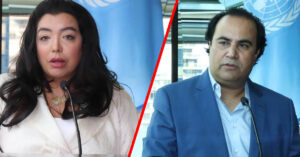With constant rise in inflation, unemployment and debt levels of Pakistan, global economic leaders from the World Bank Bank, IMF, Civil Society and experts from Washington’s top think tank, Wilson Center come together to discuss the challenges, risks and opportunities while suggesting way forward to revamp the economy.

MICHAEL KUGELMAN
Director, South Asia Institute

Michael Kugelman, the Director of the South Asia Institute at the Wilson Center, is a leading specialist on Afghanistan, India, and Pakistan and their relations with the United States. The editor or co-editor of 11 books, he has written for The New York Times, Foreign Policy, Foreign Affairs, and other publications, covering topics ranging from U.S. policy in Afghanistan to terrorism to water, energy, and food security in the region.
Full Bio
Mr. Kugelman is the director of the Wilson Center’s South Asia Institute. He is also a columnist for Foreign Policy magazine and writes its South Asia Brief, a weekly newsletter of news and analysis from the region. He has managed the South Asia portfolio at the Wilson Center since 2007, and he leads the Center’s programming and research on the region. His main specialty is Pakistan, India, and Afghanistan and U.S. relations with each of them. His current recent projects focus on shifting geopolitics in South Asia, US-India technology cooperation, the future of US-Pakistan relations, and the role of strategy during the US-led war in Afghanistan. He has published op-eds and commentaries in the New York Times, Los Angeles Times, Foreign Affairs, Politico, Bloomberg View, CNN.com, NPR, Al Jazeera, and newspapers and magazines in India and Pakistan.
He has been interviewed by numerous major media outlets including the New York Times, Washington Post, Financial Times, Guardian, Christian Science Monitor, National Geographic, BBC, CNN, NPR, and Voice of America. He has also produced a number of longer publications on South Asia, including the edited volumes Pakistan’s Interminable Energy Crisis: Is There Any Way Out? (Wilson Center, 2015), Pakistan’s Runaway Urbanization: What Can Be Done? (Wilson Center, 2014), and India’s Contemporary Security Challenges (Wilson Center, 2013). He has published policy briefs, journal articles, and book chapters on issues ranging from Pakistani youth and social media to India’s energy security strategy and transboundary water management in South Asia.
Mr. Kugelman received his M.A. in law and diplomacy from the Fletcher School at Tufts University. He received his B.A. from American University’s School of International Service. Follow him on Twitter @michaelkugelman
David R. Malpass
Former President, World Bank Group

13th President of the World Bank Group, April 9, 2019 – June 1, 2023
David R. Malpass was the 13th President of the World Bank Group.
During his tenure, Mr. Malpass focused on seeking stronger policies to increase economic growth, alleviate poverty, improve living standards, and reduce government debt burdens. Under his leadership, the Bank Group responded quickly to global crises, mobilizing a record $440 billion in response to the COVID-19 pandemic, war in Ukraine, sharp global economic slowdown, unsustainable debt burdens, climate change, and food, fertilizer, and energy shortages. The Bank Group also more than doubled its climate finance to developing countries during Mr. Malpass’s presidency, reaching a record $32 billion in FY22.
Prior to his appointment at the World Bank Group, Mr. Malpass served as Under Secretary of the Treasury for International Affairs for the United States. Mr. Malpass represented the United States in international settings, including the G-7 and G-20 Deputy Finance Ministerial, World Bank–IMF Spring and Annual Meetings, and meetings of the Financial Stability Board, the Organization for Economic Cooperation and Development, and the Overseas Private Investment Corporation.
In 2018, Mr. Malpass advocated for the capital increase for the IBRD and IFC as part of a reform agenda featuring sustainable lending practices, more efficient use of capital, and a focus on raising living standards in poor countries. He was also instrumental in advancing the Debt Transparency Initiative, adopted by the Bank Group and the IMF, to increase public disclosure of debt and thereby reduce the frequency and severity of debt crises.
Before joining the U.S. Treasury, Mr. Malpass was an international economist and founder of a macroeconomics research firm based in New York City. He served as chief economist of Bear Stearns and conducted financial analyses of countries around the world.
Previously, Mr. Malpass served as the U.S. Deputy Assistant Secretary of the Treasury for Developing Nations and Deputy Assistant Secretary of State for Latin American Economic Affairs. He focused on an array of foreign policy and development issues, including U.S. involvement in multilateral institutions; the Bank Group’s 1988 capital increase, which supported the creation of the Bank’s environment division; the Enterprise for the America’s Initiative; and Brady bonds to address the Latin American debt crisis. He also served as Senior Analyst for Taxes and Trade at the U.S. Senate Budget Committee, and as Staff Director of the Joint Economic Committee of the U.S. Congress.
Mr. Malpass has served on the boards of the Council of the Americas, Economic Club of New York, National Committee on U.S.–China Relations, Manhattan Institute, and Gary Klinsky Children’s Centers, as well as various for-profit entities. He is the author of numerous articles on economic development.
Mr. Malpass earned his bachelor’s degree from Colorado College and his MBA from the University of Denver. He was a CPA and undertook advanced graduate work in international economics at the School of Foreign Service at Georgetown University and has studied Spanish, Russian, and French.
Mr. Malpass and wife Adele Malpass, a journalist, live in Washington, D.C. They have four children and share a strong family interest in development issues.
Dr. Aasim M. Husain
Deputy Director IMF 1990-2021
Aasim M. Husain is currently Deputy Director in the Middle East and Central Asia Department (MCD) of the IMF, where he supervises the department’s regional work on the GCC, and on several countries in the region. Prior to joining MCD in March 2015, Mr. Husain served in the European Department—where he supervised work on several Central, Eastern, and Southeastern European countries—and in the Strategy, Policy, and Review Department, where he led the Fund’s policy development work on capital flows and reviewed country work on many of the large emerging market economies. Previously, Mr. Husain served as IMF mission chief for Italy, Egypt, Jordan, and Kazakhstan, and headed the Fund’s work on commodity and energy issues. During 1995-96, Mr. Husain served as Chief Economist at ABN-AMRO Bank NV, Pakistan, and in 1999-2000 he served as desk economist on Pakistan at the IMF.
Mr. Husain is from Pakistan. He received his Bachelor of Arts degree in Economics and Mathematical Sciences from Rice University and his Doctor of Philosophy in Economics from the University of Pennsylvania. He joined the IMF in 1990.







